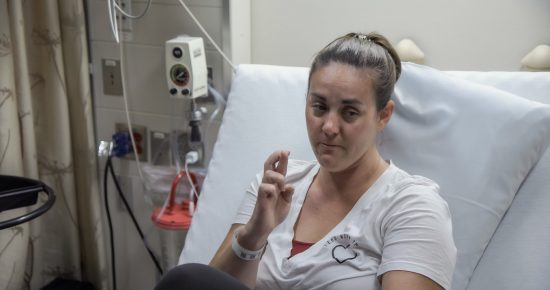Review: The Human Trial – “ We should celebrate all these pioneers”

Maren Badger, patient 1, in THE HUMAN TRIAL
It’s a ‘joke’ in the community of people with type 1 diabetes (T1D) that, “the cure is always 5 years away.” So says director, and diabetic, Lisa Hepner in her documentary The Human Trial. Hope, it seems, is a roller coaster ride for these sufferers, with promising leads to a cure being found and then subsequently lost. Hepner was diagnosed at age 21, and now thirty years later she’s still waiting for that cure to come. But new research and technologies are now causing hope to spike amongst many, and it’s the long journey towards making these discoveries come to life that Hepner concentrates on in her new film.
Type 1 diabetes results from a lack of insulin being produced by the pancreas, leading to spikes in blood glucose. This is a terribly simplistic view of the disease that Hepner does a much better job of explaining in the film, but know that it can be truly debilitating, especially if your blood sugar is very difficult to get under control. It can lead to blindness, neuropathies, even limb amputations. It is expensive to treat as well, especially if you do not have insurance, with the price of insulin incredibly high, as well as the cost of glucose monitors and other supplies needed to dose and maintain. So a cure for many, if not all diabetics, would literally change millions of lives in an instant.
Hepner though decides to concentrate on two specific people in a clinical trial. They will be the very first people to receive a bioartficial pancreas that uses stem cells to produce insulin made by a biotech start up called ViaCyte. The first is Maren, diagnosed at age 2, who, while terrified sees herself as a pioneer. She is desperate to change her life, not just for herself but for her children. The other is Greg, diagnosed at age 11, who admits he didn’t take great care early on in controlling his diabetes which has led now to vision problems. He as well has a daughter whom he would love to see grow up.
ViaCyte VP Michael Scott (don’t worry, he isn’t like THAT Michael Scott) explains how the different phases of clinical trials work. Each and every drug that comes to market has to meet certain benchmarks of safety before the FDA will approve them to move to human trials. But, with every new product someone has to be first. And these patients put their lives on hold, and sometimes on the line, to advance science. The scientists are trying to manufacture a cure, and at the same time are creating hope – something that someone with a chronic illness needs in spades.
My education is in medicine, and I found this documentary quite fascinating, yet at the same time feel it is presented in a way that will be equally interesting for anyone without a science background. Hepner does a good job of making this film accessible, and never over-complicates things. Viewing The Human Trial is watching science in motion! It’s incredibly impressive to see how it progresses from a hypothesis, to a concept, to being an actual tangible product.
Yet it’s equally fascinating, and frustrating, to see the obstacles a start up like ViaCyte has to go through in order to try and produce groundbreaking change. It makes you wonder how many other possible cures for chronic diseases are lost due to lack of financing and want of profit. I mean, Canadian scientists Banting and Best sold their patent on insulin for $1 stating insulin belonged not to them, but to the world. It’s now a $245 billion industry. That said, without profit, pharmaceutical companies can’t do research and they can’t invest in companies like ViaCyte. It’s a double edged sword, but with lives hanging in the balance it feels like there must be a better way. The film doesn’t delve far into what that is, but rightly recognizes the moral complexity.
By putting Maren and Greg at the centre of The Human Trial, Hepner brings a personal element to her documentary. It’s not just ‘people’ that research like this helps, it’s THESE people. It’s their families that reap the benefits if science is successful. It’s even the director herself, and she isn’t afraid to share a little of her story either. There are a few points towards the end where The Human Trial starts to waver into sounding a bit like an infomercial, yet it always grounds itself with a healthy dose of empathy.
Maren and Greg, and director Hepner, are but a few faces of the millions affected by diabetes. They are also the faces of those that bring science one step closer to a cure. We should celebrate them. We should celebrate all these pioneers that selflessly volunteer to help bring advancements to medicine in many cases of chronic illness. The Human Trial even makes you think of those that were the first to get the COVID vaccination and how thankful we should be to them for allowing us all a chance at immunization. It’s truly amazing what can be accomplished when science and people can work together from both sides of the public and private sector. Hopefully, with co-operation between them all, the cure for type 1 diabetes will be even closer than the ever promised 5 years, and the lives of millions will be changed. It all just starts with one.
The Human Trial is available in theatres and digital June 24th.










